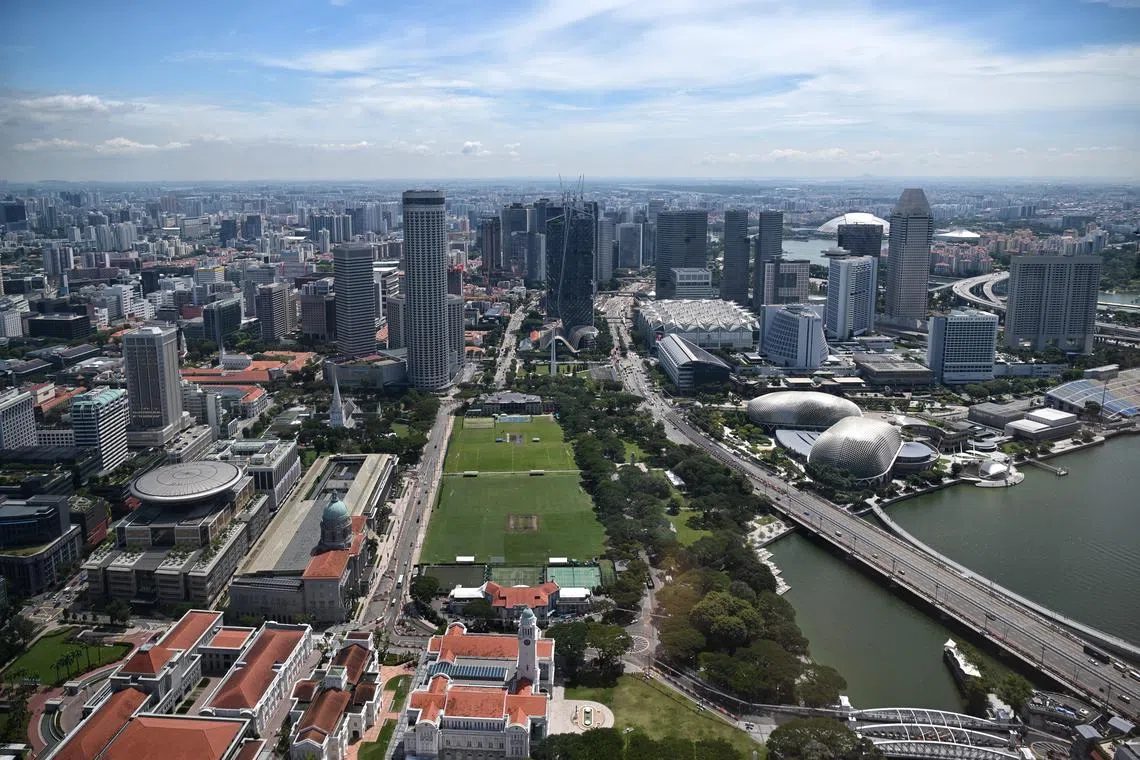Singapore chips away at Hong Kong’s hedge fund dominance
Sign up now: Get ST's newsletters delivered to your inbox

At least 16 firms already operating in Hong Kong added a Singapore office between the start of 2019 and end of 2021.
PHOTO: ST FILE
SINGAPORE – Singapore is cementing its status as a regional hot spot for hedge funds, with the number of firms expanding from Hong Kong to the city state trebling in the past three years.
At least 16 firms already operating in Hong Kong added a Singapore office between the start of 2019 and end of 2021, compared with just five in the previous three-year period, according to a Bloomberg News analysis of regulatory and business registry data in both financial hubs.
Among those that put boots on the ground in Singapore are some of the largest global managers, such as Marshall Wace, Citadel and D.E. Shaw & Co. There are also smaller regional peers, including Ovata Capital Management and Trivest Advisors.
While Hong Kong’s status as the dominant hedge fund hub in Asia
Singapore’s treaty with India has historically positioned it as a tax-efficient base for investments in Asia’s third-largest economy. It is also a natural gateway to fast-growing regional neighbours like Vietnam and Indonesia.
Rich families are increasingly setting up family offices in Singapore, creating a pool of capital that hedge funds can tap.
Singapore serves as a “prime springboard” for expansion, said Mr Lee Kher Sheng, co-head for the Asia-Pacific region at global trade body Alternative Investment Management Association (AIMA). “Some firms pursuing pan-Asian or China-plus-one growth strategies are beginning to see India and Indonesia as crucial.”
Future-proofing
The biggest single jump in hedge fund arrivals in Singapore was in the second half of 2019, the Bloomberg data analysis shows. That was when Hong Kong was rocked by months-long political protests, often resulting in clashes between demonstrators and the police, and business suspensions.
“There is definitely an increase in firms setting up in Singapore,” said Ms Philippa Allen, founder of ComplianceAsia Consulting, citing regulator comments to the industry on its vetting workload. “Managers realised that they needed better business backup plans, and the best solution to that is to have two offices in different places.”
While the pace of new hedge fund openings has slowed since 2020, the flow of money continues to grow.
Hedge fund assets under management in the city jumped 30 per cent in a year to $257 billion in 2021, the biggest dollar increase on record, according to Monetary Authority of Singapore (MAS) data released in October and an analysis of past reports.
While China was once the dominant destination for international investors in Asia, many are starting to allocate more to India and South-east Asian countries, which have been big beneficiaries of the move to diversify supply chains.
Singapore is an obvious base to push further into this region because it has better access to talent that knows the markets and fewer Covid-19-related travel requirements. There are financial and business incentives too. In 2020, Singapore launched a new corporate structure called a “variable capital company”, or VCC, which gives hedge funds a more flexible investment structure, including not having to publicly release shareholder names. It also has a comprehensive tax treaty with India that can help avoid double taxation in many cases.
Singapore is now the second-largest source of foreign portfolio inflows into India after the United States, according to data from India’s National Securities Depository. About 20 per cent of the 660 Singapore VCCs set up as at Oct 14 are hedge funds, according to the MAS.
One firm that is diversifying is Pinpoint Asset Management. Having started as a China-focused manager, it opened in Singapore as part of an effort to expand a fund that invests across Asia through different portfolio managers. It also has offices in India and Japan, said managing director Jennifer Wong.
“We want to capture investment opportunities in these markets due to their strong development and growth,” Ms Wong said.
Another is Hong Kong-based Ovata, a US$1.1 billion (S$1.5 billion) hedge fund firm started by members of the BlueCrest Capital Management equity team, which now has eight employees in Singapore, said a person with knowledge of the matter.
Hong Kong strength
While the increasing number of satellite offices opening in Singapore is a sign of how the centre of financial gravity in the region is shifting, Hong Kong is making a big effort to stage a comeback and convince the rest of the world that it remains the go-to place in Asia for finance.
It hosted a star-studded summit in November with top executives from all the world’s biggest banks. It has also dismantled many of the Covid-19 restrictions – such as hotel quarantine – that have kept the city isolated.
For many of the biggest hedge funds, even if they have also opened in Singapore, Hong Kong still dominates when it comes to staffing. For example, while Marshall Wace, a US$62 billion London-based giant, has ramped up headcount in its Singapore outpost to about 20, it still has around 50 people in its Hong Kong office, according to a person briefed on the matter.
“As long as China continues to hold the attraction of the world and remains investable, Hong Kong will be viable,” said AIMA’s Mr Lee. “Singapore has different strengths. So this is a positive-sum environment, and the industry wants both to thrive.” BLOOMBERG


